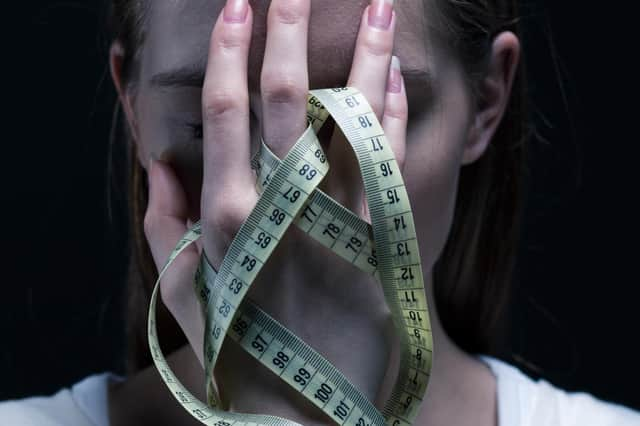Nikki Grahame death: why the media should have a duty of care towards people with eating disorders


The death of former Big Brother contestant Nikki Grahame hit me hard when it was announced on Saturday 10 April. She was 38 and had experienced anorexia for three decades.
Grahame’s death was met with heartfelt condolences from those who knew her best, from her close friends to the likes of Davina McCall who hosted Big Brother during its 11 seasons on Channel 4.
Advertisement
Hide AdAdvertisement
Hide AdTributes described Grahame as the “funniest, most bubbliest, sweet girl” and “a kind, sensitive soul, full of empathy”, leaving one to wonder how such a beautiful character endured 30 years of mental illness.
For me, this is personal. Before I was diagnosed with anorexia in my teens, I too thought you couldn’t develop an eating disorder if you were a confident, outgoing and sociable person.
And much like Grahame, my life until that point had been happy. I had been surrounded by love and had never gone through the traumatic experiences you would expect of someone who starves themselves to the brink of death.
But among many of the things I read about Nikki, one thing stood out to me – the role of the media in her declining mental health.
Advertisement
Hide AdAdvertisement
Hide AdAccording to experts, the media’s coverage of body types cannot in isolation cause anorexia, however it can be a contributing factor.
As eating disorder charity, Beat, says: “Eating disorders are complex illnesses – there is no single cause. Instead they are thought to be caused by a combination of biological, psychological, and sociocultural factors.”
When Nikki Grahame entered the Big Brother house, she had been experiencing issues with her eating patterns and body image for 15 years – she was clearly under pressure to look a certain way and spoke about the difficulties she had with her body image.
Reality TV serves a purpose - it is supposed to be light-hearted entertainment. But a broadcaster’s duty to entertain its audience should never come at the expense of the mental health of the contestants on its shows.
Advertisement
Hide AdAdvertisement
Hide AdDespite revealing how she had relapsed in 2011, Grahame was repeatedly invited into the spotlight, appearing on Big Brother three times after this. I would argue that her subsequent appearances on the show and spin offs were unnecessary and continued to fuel her unhealthy relationship with her body.
Being in the limelight as she battled anorexia also gave the tabloid press the opportunity to make vicious remarks about her “garish” appearance and how she looked "worse-for-wear”.
She was also the face of JYY.London clothing in 2015, with the founder of the brand describing her as “fun, pretty, very creative” and saying “she’s got a naturally healthy petite frame”.
As someone who campaigned to raise awareness of anorexia for six years, I understand that these comments only perpetuate the habit of valuing yourself on your body weight.
Advertisement
Hide AdAdvertisement
Hide AdIt is also irresponsible for a clothing brand to promote its products for “naturally healthy and petite” bodies using a model who has an eating disorder.
Normalising a person’s unhealthy relationship with food is detrimental to those recovering from or currently experiencing anorexia, and promotes the idea that it’s fine to deny the illness.
While there have been concerns raised about media coverage of bodies for decades, I still see plenty of triggering articles in tabloids and magazines targeted at a female audience. So how can journalists and broadcasters report on these topics responsibly?
B-eat has recommended that body weight is not mentioned in articles that discuss people who have eating disorders as this deflects from the real mental health issue at hand, while also contributing to the “I’m not as thin/ill as that person so I must not be sick” narrative. The charity doesn’t contribute to articles that share information about diets either, as it believes these too only promote unhealthy relationships with food.
Advertisement
Hide AdAdvertisement
Hide AdIt’s time that the UK’s media outlets took note and developed a similar duty of care towards the people participating in their shows, forming the subject of their articles - and ultimately driving their audience figures.
While the media cannot and should not be held responsible for Grahame’s untimely and sad passing, publications and broadcasters must stop fuelling the fire with the daily onslaught of commentary on women’s bodies, outfit choices, diets and exercise regimes.
Instead, why don’t we talk more about what women have achieved and who they are - and put a lid on the conversation about bodies?
If you have been affected by an eating disorder and need help, please contact Beat on one of the following helplines, or speak to someone for free on their web chat.
Helpline: 0808 801 0677
Studentline: 0808 801 0811
Youthline: 0808 801 0711
Advertisement
Hide AdAdvertisement
Hide AdHelplines are open 365 days a year from 9am–8pm during the week, and 4pm–8pm on weekends and bank holidays.
If you are in need of urgent help for yourself or someone else outside of Helpline opening hours, please contact 999 or the Samaritans on 116 123 if you or someone else is in immediate danger.
Read more: